(RNS) — The statement is signed by 11 Christian LGBTQ groups representing tens of thousands of constituents and roughly 5,000 congregations.
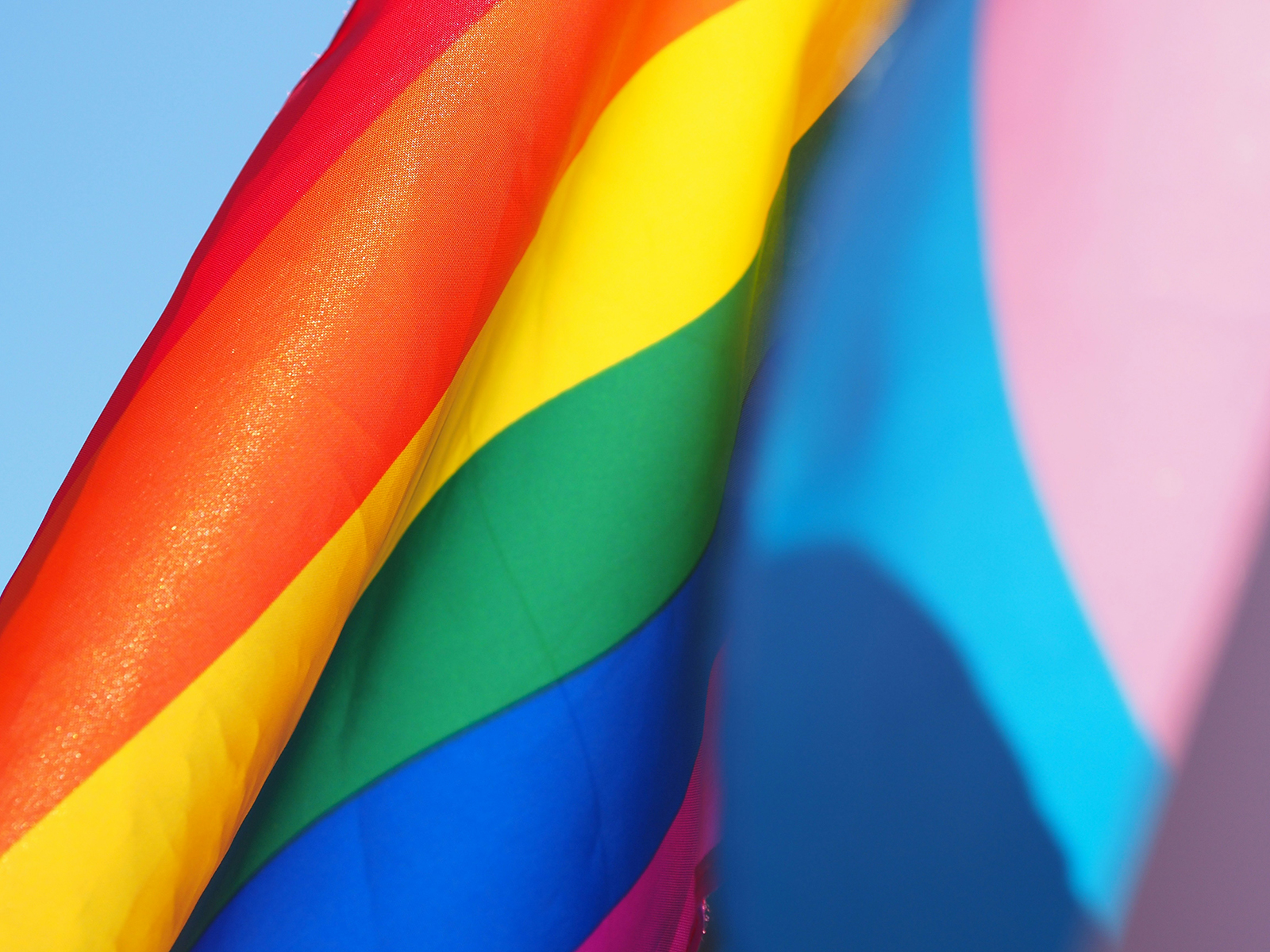
(Photo by Cecilie Bomstad/Unsplash/Creative Commons)
Kathryn Post
March 5, 2025
(RNS) — For many Christians, the ashes dispensed on Ash Wednesday are a tactile reminder of their humanity. And in the wake of the Trump administration’s slew of targeted executive actions, a group of queer Christian leaders says that reminder is timelier than ever.
A new statement, signed by 11 Christian LGBTQ groups representing tens of thousands of constituents and roughly 5,000 congregations and released Wednesday (March 5), is timed to correspond with Ash Wednesday and explains the groups’ opposition to President Donald Trump’s policies regarding LGBTQ rights, immigration and disruptions to federal funding for vulnerable populations as they relate to the holy day.
The coalition, called the Collective of Queer Christian Leaders, hopes to contrast the new administration’s policies with the self-giving love of Christ recognized during the Lenten and Easter season, according to the statement.
“We are organizing, advocating and fighting back because no system, no proclamation, no oppressive project can separate you from the love of God, the love of community or the power we hold when we rise together,” the statement reads.
The statement lists five administration actions the groups oppose, including: “attempts to erase or criminalize transgender and nonbinary people”; sending immigrants to “extrajudicial detention facilities” or to countries where they are at risk; “the disintegration of safety nets that protect and uplift our neighbors”; “the illegal and unconstitutional accessing of personal private data by unelected, unvetted and unqualified personnel appointed by the president”; and “the calculated dismantling and disruption to funding that protects the most vulnerable in our society, paid for by taxes such as Social Security and Medicare that keep millions of Americans out of poverty.”
“You have heard your share of politicians, and pundits claim that your existence is in opposition to your faith,” the statement says. “Know that just as you may confound the Empire today, Jesus confounded the Empire of his time and place.”

People wave signs during a pro-transgender rights rally outside of Seattle Children’s Hospital after the institution postponed some gender-affirming surgeries for minors following an executive order by President Donald Trump, Feb. 9, 2025, in Seattle. (AP Photo/Lindsey Wasson)
On Tuesday, a federal judge granted a preliminary injunction pausing Trump’s executive orders that aimed to officially recognize only two sexes, male and female, and to cut federal funding for providers of gender transition care for youths.
Most of the Christian LGBTQ groups that signed on to the statement are independent nonprofits that advocate for queer inclusion within a denomination, and they represent a broad theological spectrum, from Mennonites to Methodists, Baptists and Lutherans. Though many of the groups have collaborated informally for decades, in 2023 the coalition solidified into the Collective of Queer Christian Leaders. This is their first public statement, but the authors said they hope it’s the first of many.
And while coalition members may have different perspectives on church polity or predestination, they agree many of the Trump administration’s policies are the product of white Christian nationalism, an ideology the statement describes as “hijacking” the Christian gospel.
“Those who are operating from the white Christian nationalist viewpoint would like society to believe that they are the face of true Christianity, that they are the face of faith,” said Cameron Van Kooten Laughead, executive director of Room for All, which advocates for LGBTQ folks within the Reformed Church in America and signed onto the statement. “And so, we’re able to name that, no, that’s not Christianity. That’s white Christian nationalism. And we’re over here following a brown savior who was dedicated to disrupting an empire. So, these are not the same thing, and there is a message of hope.”

Cameron Van Kooten Laughead. (Courtesy photo)
The aftershocks of Trump’s executive orders the statement ties to “white Christian nationalism” have been felt by many of its authors, they told RNS. For example, Van Kooten Laughead, who lives in Des Moines, Iowa, pointed to the state’s recent decision to remove gender identity as a protected category under its civil rights laws.
“We are the first state in the country to actively remove civil rights from a category of protected people,” Van Kooten Laughead said. “And that is so clearly linked, both on paper and in the statements that many of those politicians made, with this kind of hall pass that was given to them by the current federal presidential administration.”
Brian Henderson, executive director of the Association of Welcoming and Affirming Baptists, which also signed the statement, said he’s been fielding calls from concerned constituents since Inauguration Day, including from a pastor in a red state fearful about the safety of their nonbinary and trans child.
Jan Lawrence, executive director of the United Methodist Church’s Reconciling Ministries Network, which also signed the statement, said she’s heard from queer people in the military who now feel they have targets on their backs.
Based in Chicago, the Rev. Don Abram, CEO of Pride in the Pews — a nonprofit focused on advocacy and education for Black LGBTQ+ communities — said a recent organizational event was targeted by “right-wing extremists” who directed hundreds of people to sign up on Eventbrite under false names, only to not attend.
And, the statement authors note, LGBTQ Christians are also impacted by legislation and executive orders that don’t explicitly target queerness.
“Every person that seeks out our organizations (is) multidimensional,” said Aiden Nathaniel Diaz, communications director for the big-tent Christian LGBTQ organization Q Christian Fellowship, another statement signer. “They struggle with health care. They struggle with immigration.”

Aiden Nathaniel Diaz. (Photo by Taylor Prinsen)
RELATED: Christian groups kick off Lent with letters objecting to Trump moves on budget and immigration
The coalition also hopes the statement will both remind constituents they aren’t facing the next four years alone and catalyze other Christians who have been silent, particularly on actions targeting LGBTQ communities.
“Look around,” the statement says. “Take stock of what our people need and what you can give. Leave no space for apathy. Let your mercy be an act of rebellion.”
And when the Lenten season nears its end next month, queer Christians and allies will have an opportunity to act, in the form of a rally the group is organizing. On April 14 — the day after Palm Sunday, a Christian day marking Jesus’ triumphant entry into Jerusalem — the Collective of Queer Christian Leaders and allies will gather on Capitol grounds in Washington, D.C., to call attention to political actions they oppose and the subversive gospel they believe is central to Lent and Easter.
“What Lent does, in so many ways, is remind us of humanity. And that’s not the sort of carnal humanity that we should bemoan and want to get rid of. It is the holy humanity. It is the righteous humanity. It is honoring our inherent worthiness and divinity,” Abram said. “So, this Ash Wednesday statement is an affirmation of our humanity, and an invitation.”
Survey: US religious groups support LGBTQ+ rights, divide on medical care for trans minors
(RNS) — Most US religious groups remain broadly supportive of non-discrimination laws and policies toward LGBTQ+ people. Far fewer support gender-transition medical care for minors.
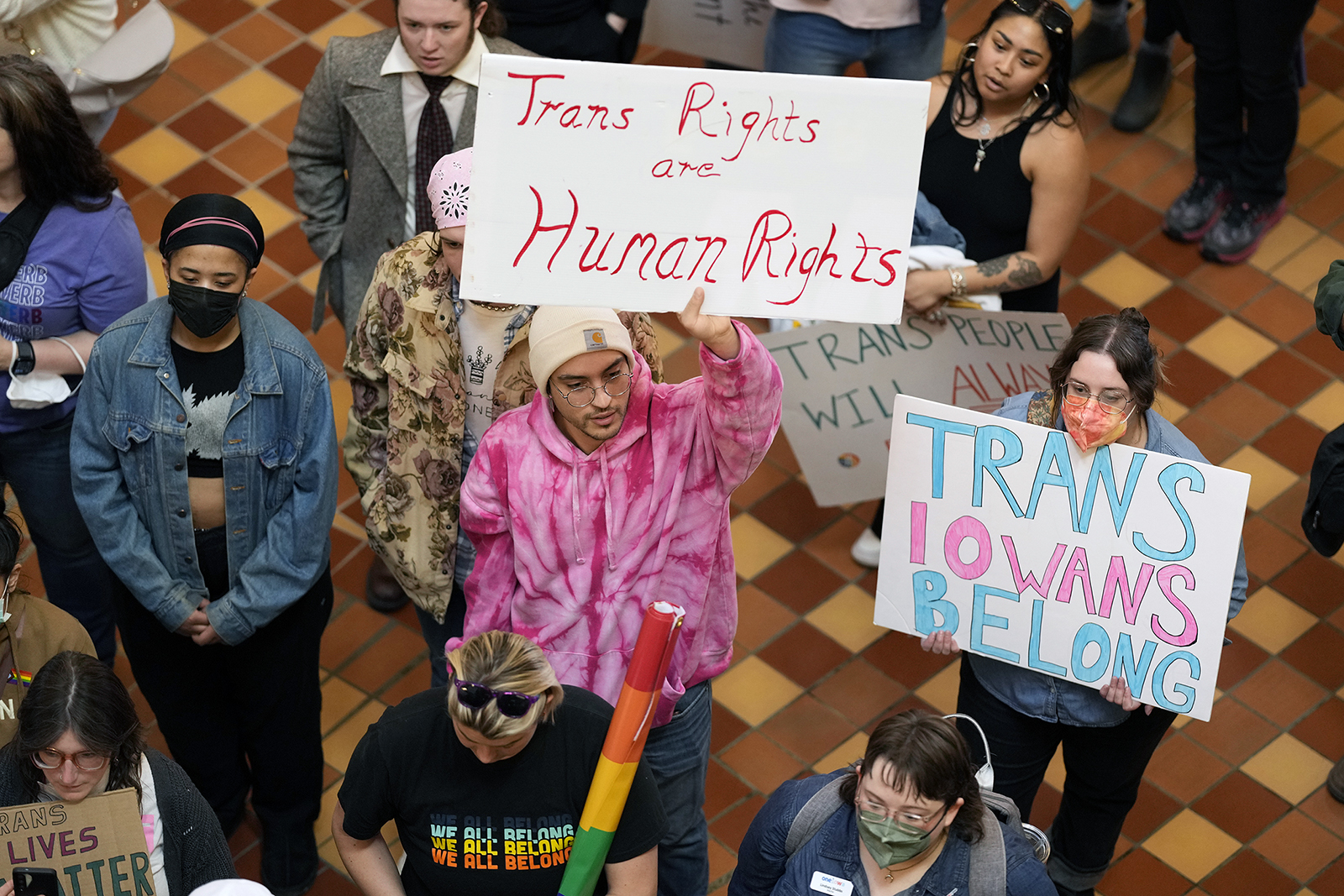
Protesters fill the Iowa state Capitol to denounce a bill that would strip the state civil rights code of protections based on gender identity, Feb. 27, 2025, in Des Moines.

Protesters fill the Iowa state Capitol to denounce a bill that would strip the state civil rights code of protections based on gender identity, Feb. 27, 2025, in Des Moines.
(AP Photo/Charlie Neibergall)
Yonat Shimron
March 4, 2025
(RNS) — Since coming into office, President Trump has signed a slew of executive orders that attempt to restrict the rights and care available to LGBTQ+ people and particularly transgender people.
Among the president’s directives: excluding transgender people from serving in the military; blocking gender-affirming care for minors; and banning transgender athletes from women’s and girls’ sports.
States are now following his example: Iowa’s Republican governor signed into law last week a measure that ends state civil rights protections for transgender people.
But over the past decade, Americans have remained broadly supportive of non-discrimination laws and policies toward LGBTQ+ people. They are less supportive of gender-transition medical care for minors, a new PRRI survey shows.
The survey, part of the American Values Atlas, which includes 22,000 adults from across the U.S. polled four times over the course of 2024, shows that support for same-sex marriage and non-discrimination protections for LGBTQ+ people remains strong.
Some 75% of Americans support nondiscrimination protections for LGBTQ+ people in housing, employment and public accommodation, up from 71% in 2015.
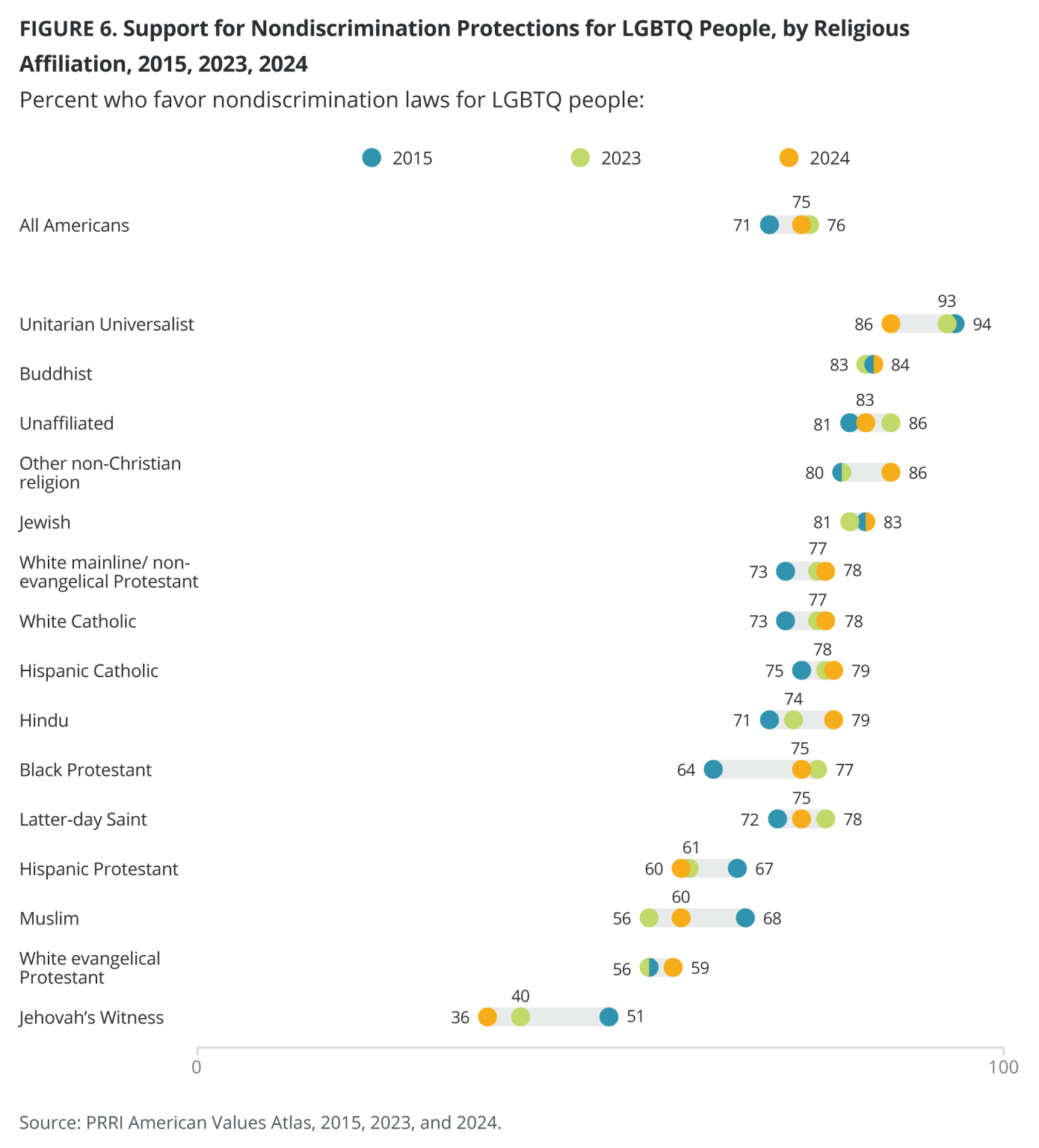
“Support for Nondiscrimination Protections by LGBTQ People, by Religious Affiliation, 2015, 2023, 2024” (Graphic courtesy of PRRI)
Religious groups support them, too. Jehovah’s Witnesses were the only religious group where such support has fallen, from 51% in 2015 to 31% in 2024.
“Over time, more Americans are supportive of non-discrimination laws and policies toward LGBTQ Americans than they were about a decade ago, and more Americans support same-sex marriage equality or marriage equality than they did a decade ago,” said Melissa Deckman, PRRI’s CEO.
The survey did, however, record a drop in support for nondiscrimination among one group: Americans ages 18-29. These youngest American adults have shown a gradual decrease in support for LGBTQ+ nondiscrimination laws, from 80% in 2015 to 73% in 2024.
Deckman said that drop is most likely among young Republicans.
“For younger Republicans, there’s been more of an emphasis in the last couple of years on opposition to transgender rights, and I suspect that that’s probably what’s happening,” Deckman said.
RELATED: Speaker Johnson cites Genesis after House passes bill banning trans people from women’s sports
Americans also oppose religious-based service refusals, such as when a small-business owner refuses to provide products or services to LGBTQ+ people if doing so would violate their religious beliefs: 58% of Americans oppose such refusals. Among religious groups, Latter-day Saints (40%), Jehovah’s Witnesses (37%) and white evangelical Protestants (31%) are the only faith groups where majorities support religious-based service refusals to LGBTQ+ people. By contrast, Buddhists, Hindus, Jews, Muslims, Catholics (both white and Hispanic), Black Protestants and mainline Protestants oppose religious service refusals.
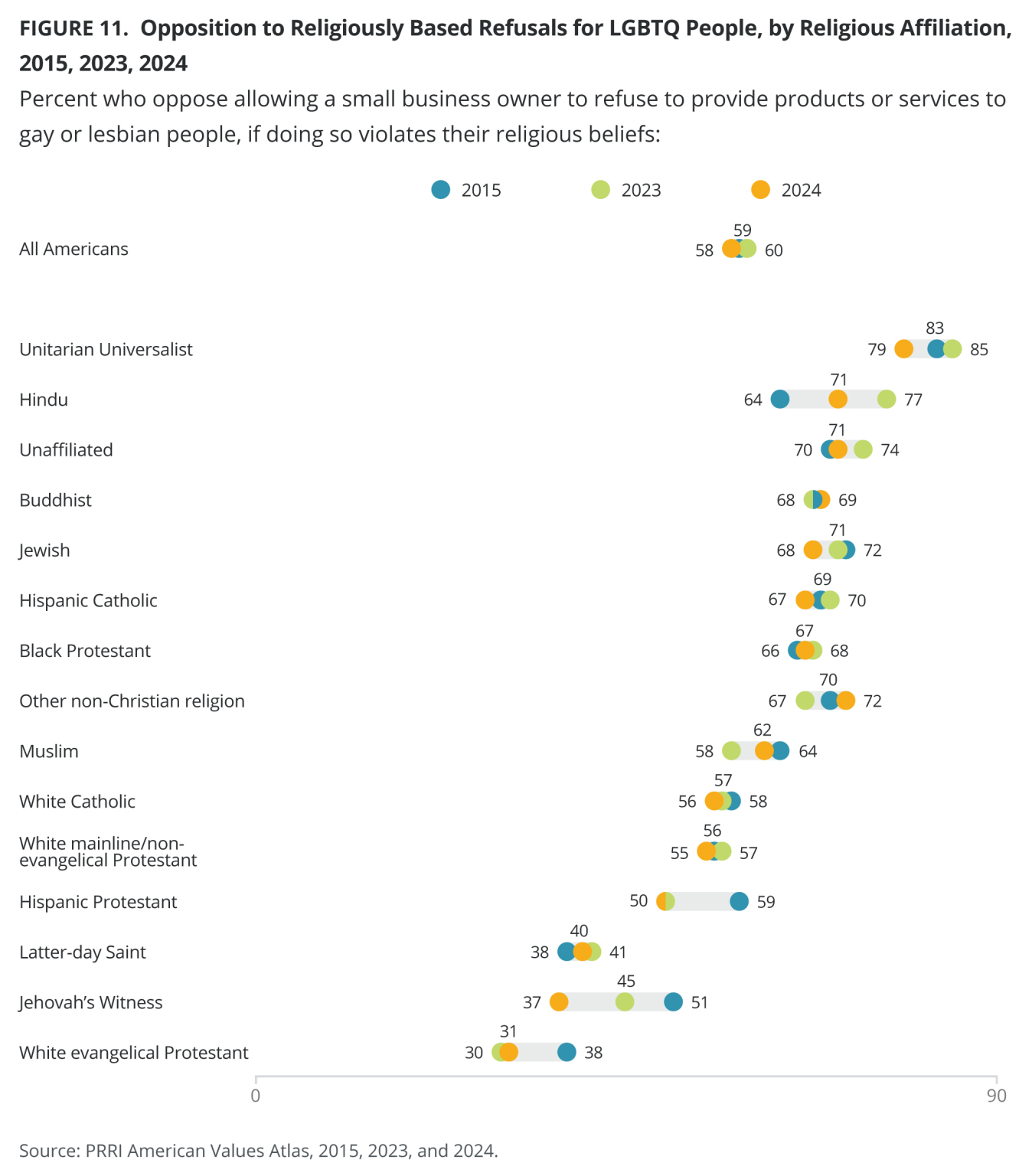
“Opposition to Religiously Based Refusals for LGBTQ People, by Religious Affiliation, 2015, 2023, 2024” (Graphic courtesy of PRRI)
When it comes to gender-affirming medical care for minors, Americans remain almost evenly divided: 49% are opposed to laws that would prevent parents from allowing their child to receive medical care for a gender transition, and 47% favor them. Opposition to transition care for minors was a new question on the survey, so there were no comparisons with past years.
Seventy percent of Democrats oppose laws that would prevent parents from allowing their child to receive medical care for a gender transition, but only 30% of Republicans oppose these laws.
Among religious groups, Christians and Muslims of all denominations do not support gender-transition medical care for minors, the survey suggests.
Support for allowing parents to get transition care for minors drops to 31% among white evangelicals and 30% among Latter-day Saints.
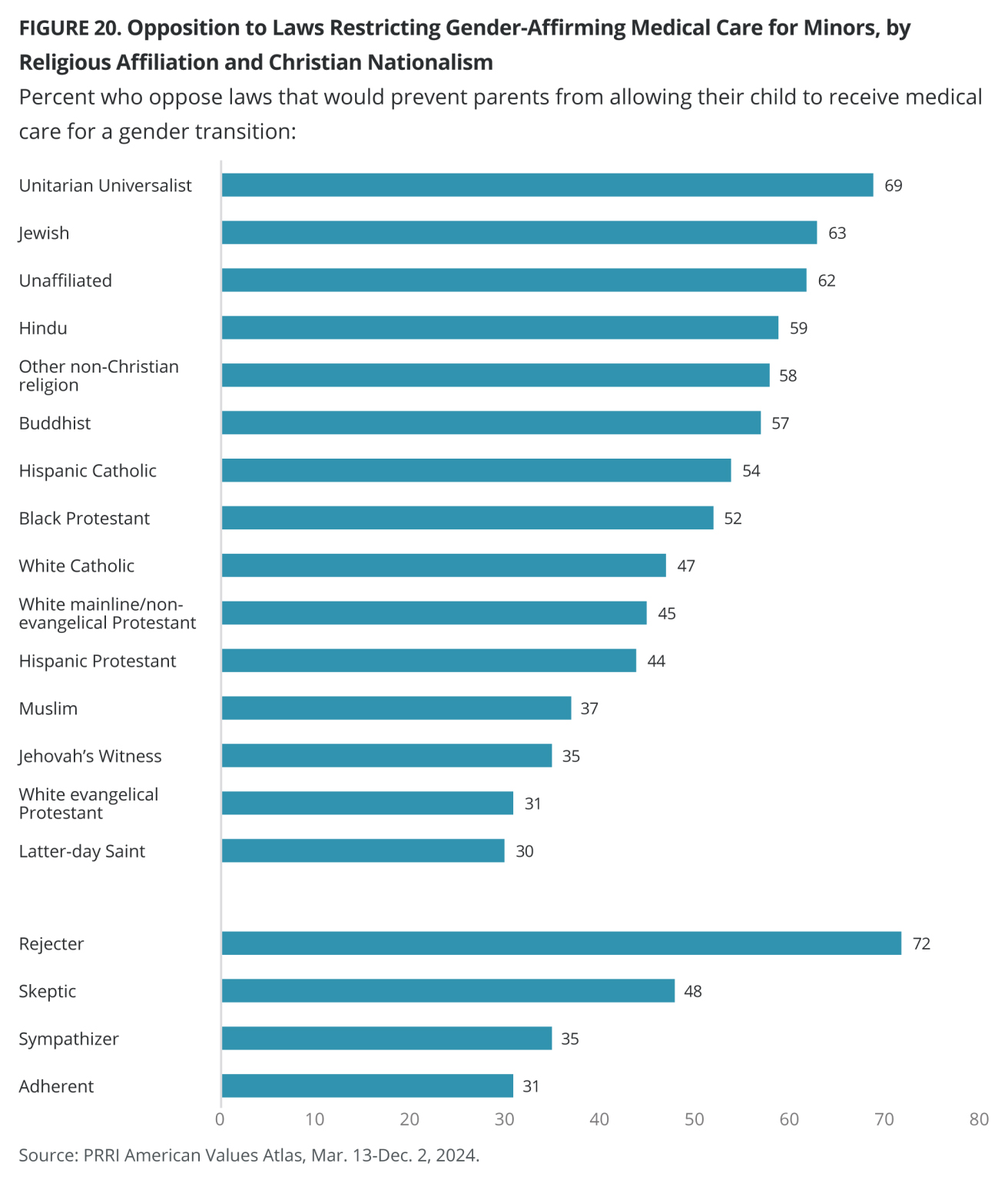
“Opposition to Laws Restricting Gender-Affirming Medical Care for Minors, by Religious Affiliation and Christian Nationalism” (Graphic courtesy of PRRI)
Overall, the survey found, 10% of Americans identified as LGBTQ+ in 2024. Generation Z, Americans born between 1997-2012, had the highest number of people identifying as LGBTQ+ at 24%.
LGBTQ+ Americans are more likely than the general population to identify as Democrats (39% vs. 29%) and less likely to identify as Republicans (10% vs. 29%). They are, however, just as likely to identify as independents (28% vs. 26%).
No comments:
Post a Comment